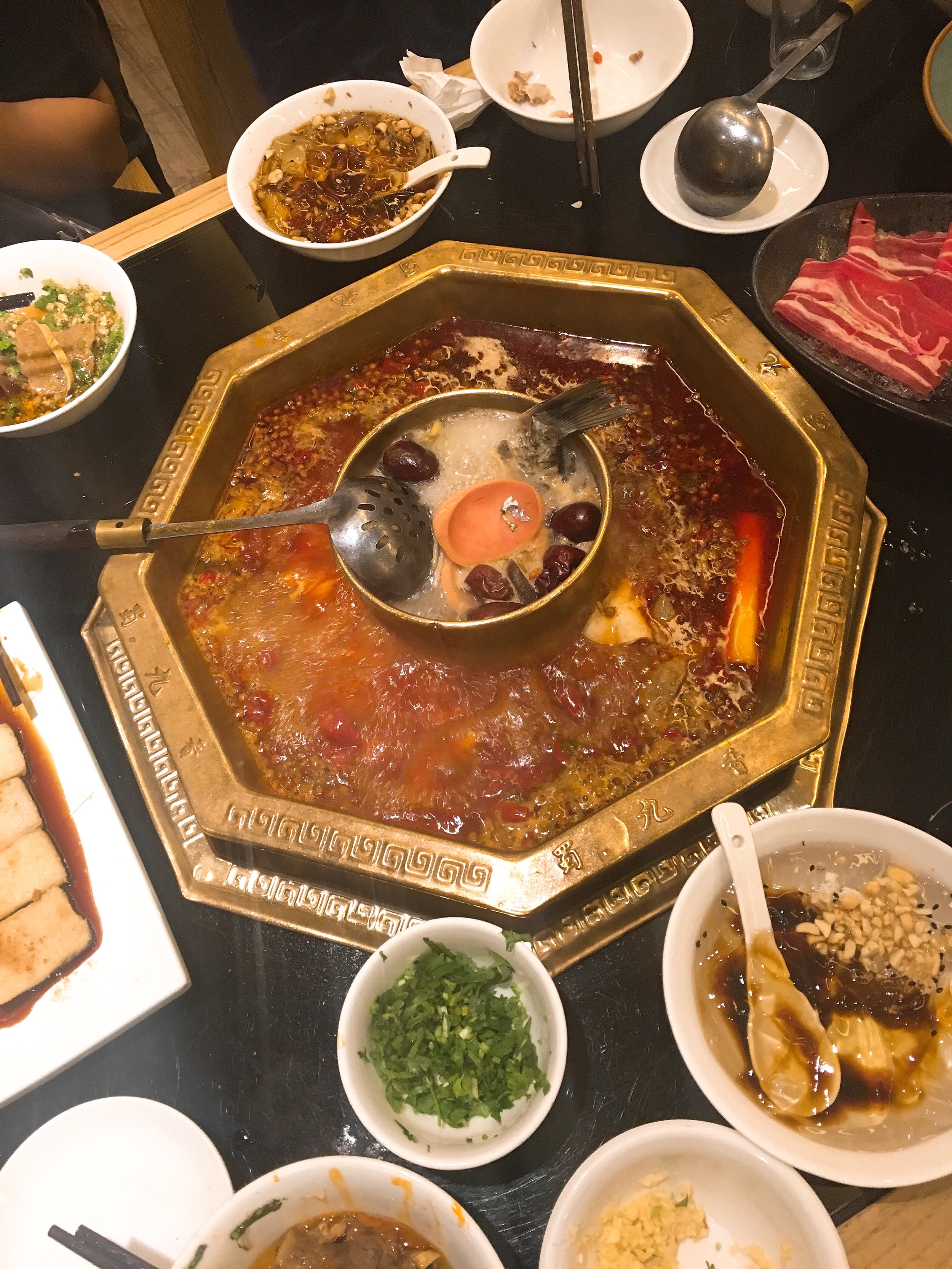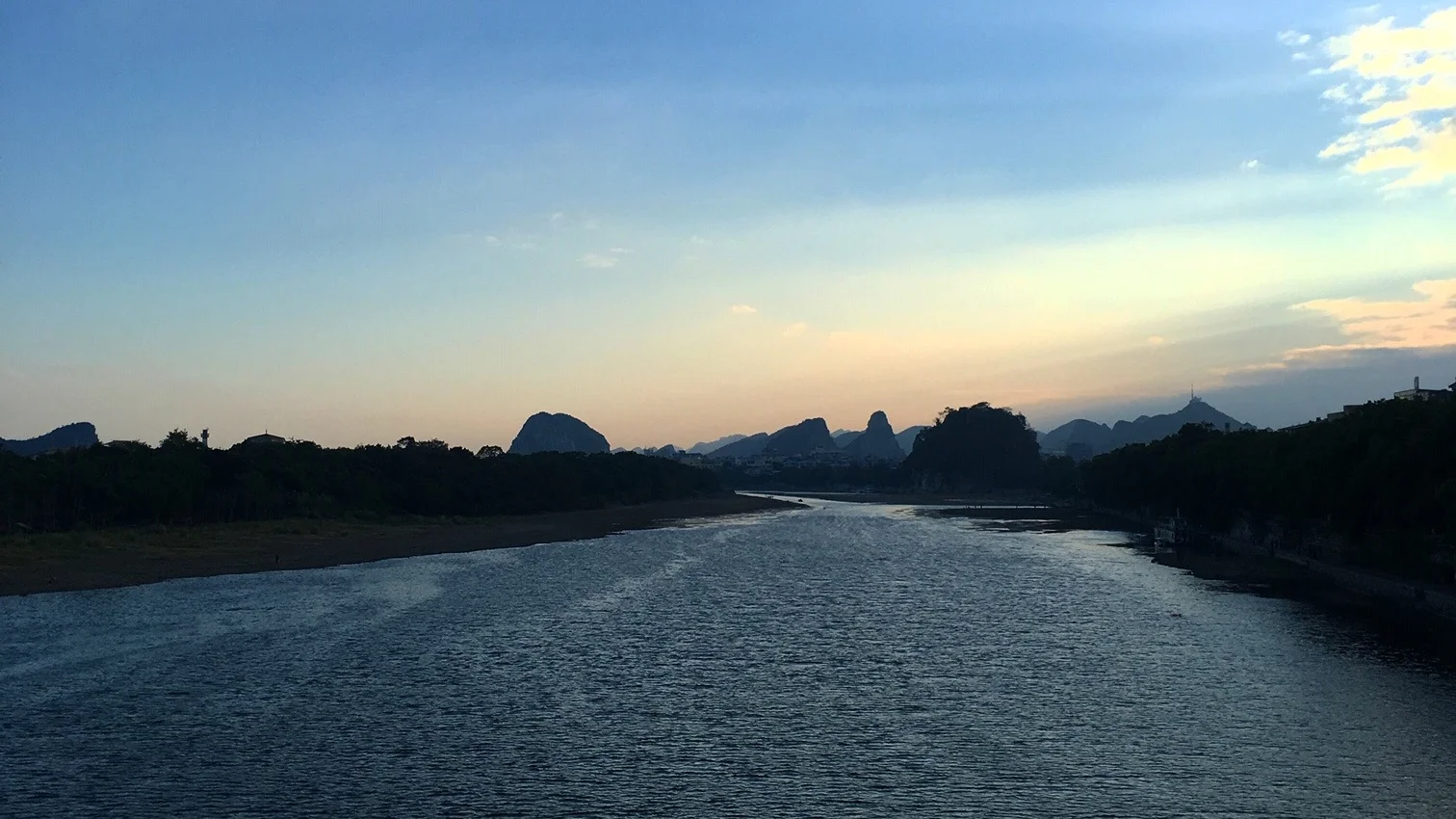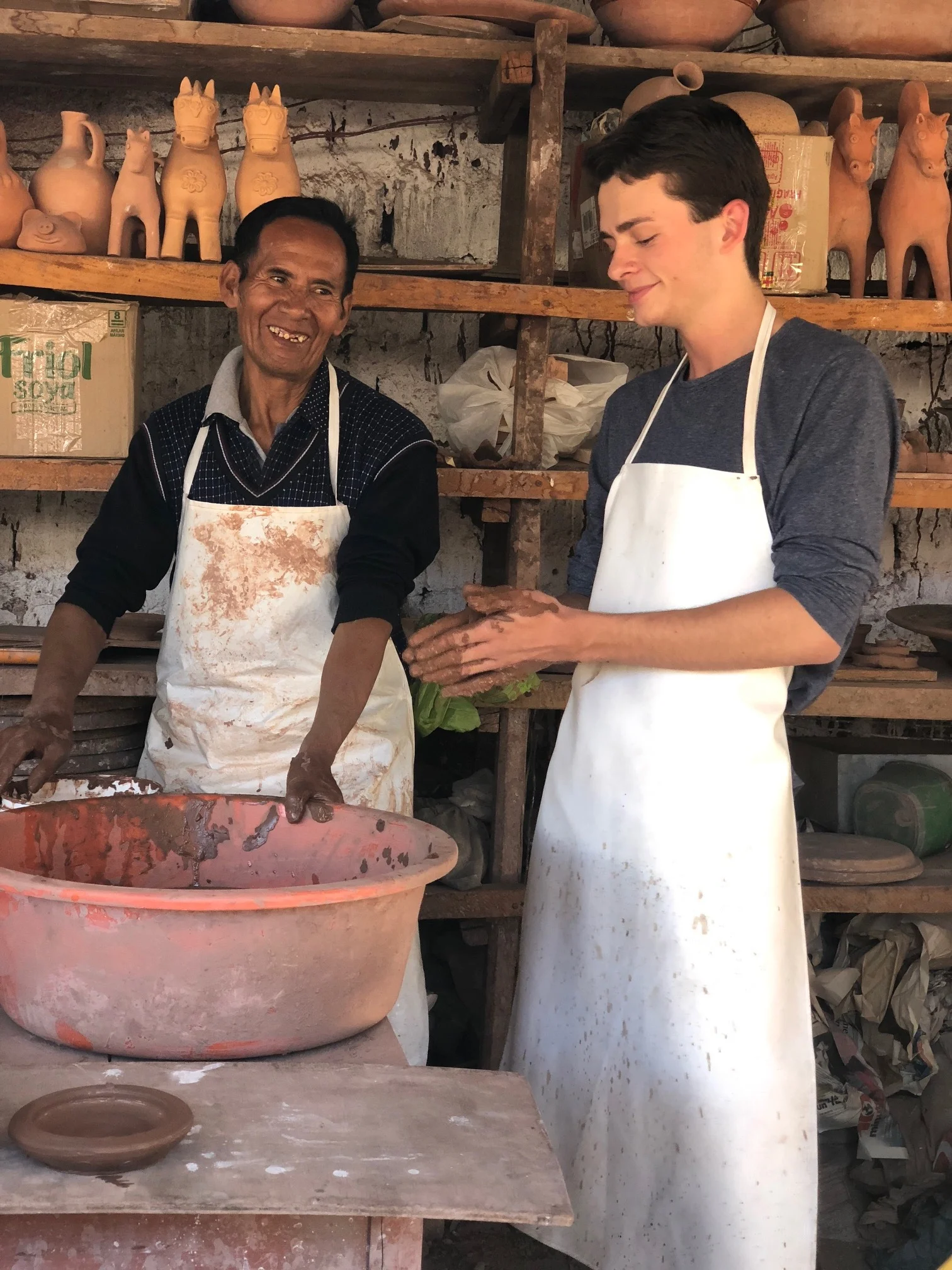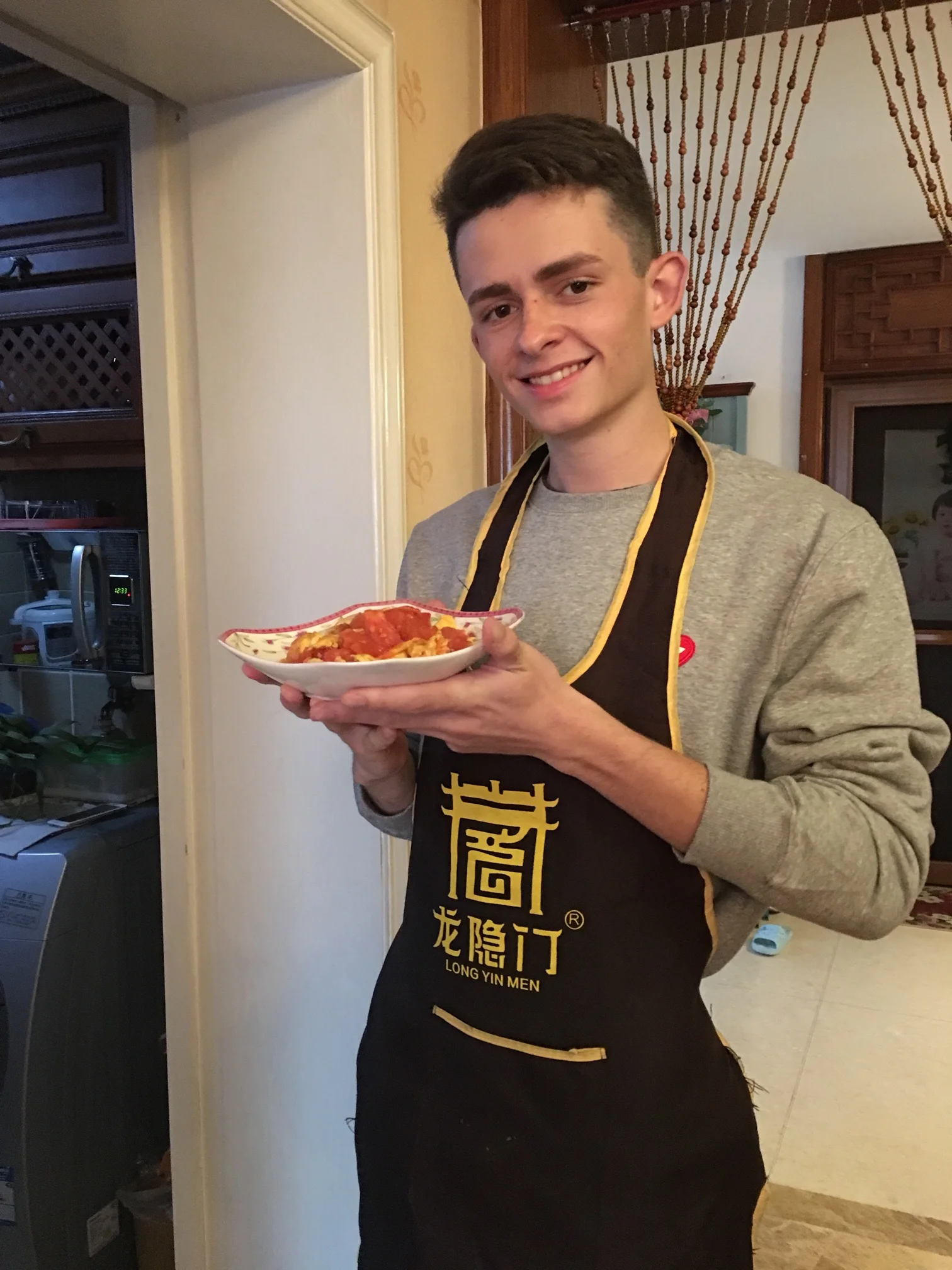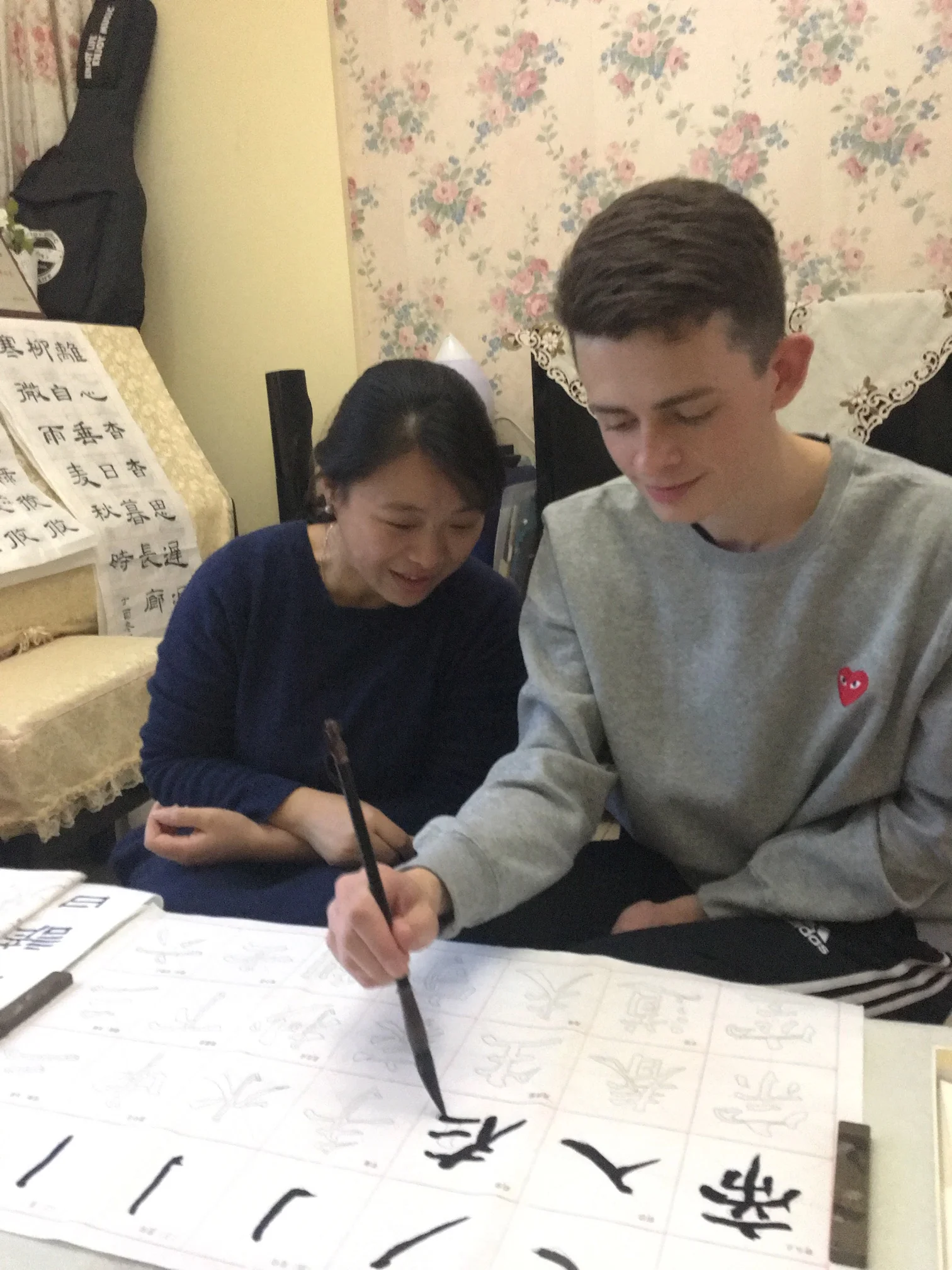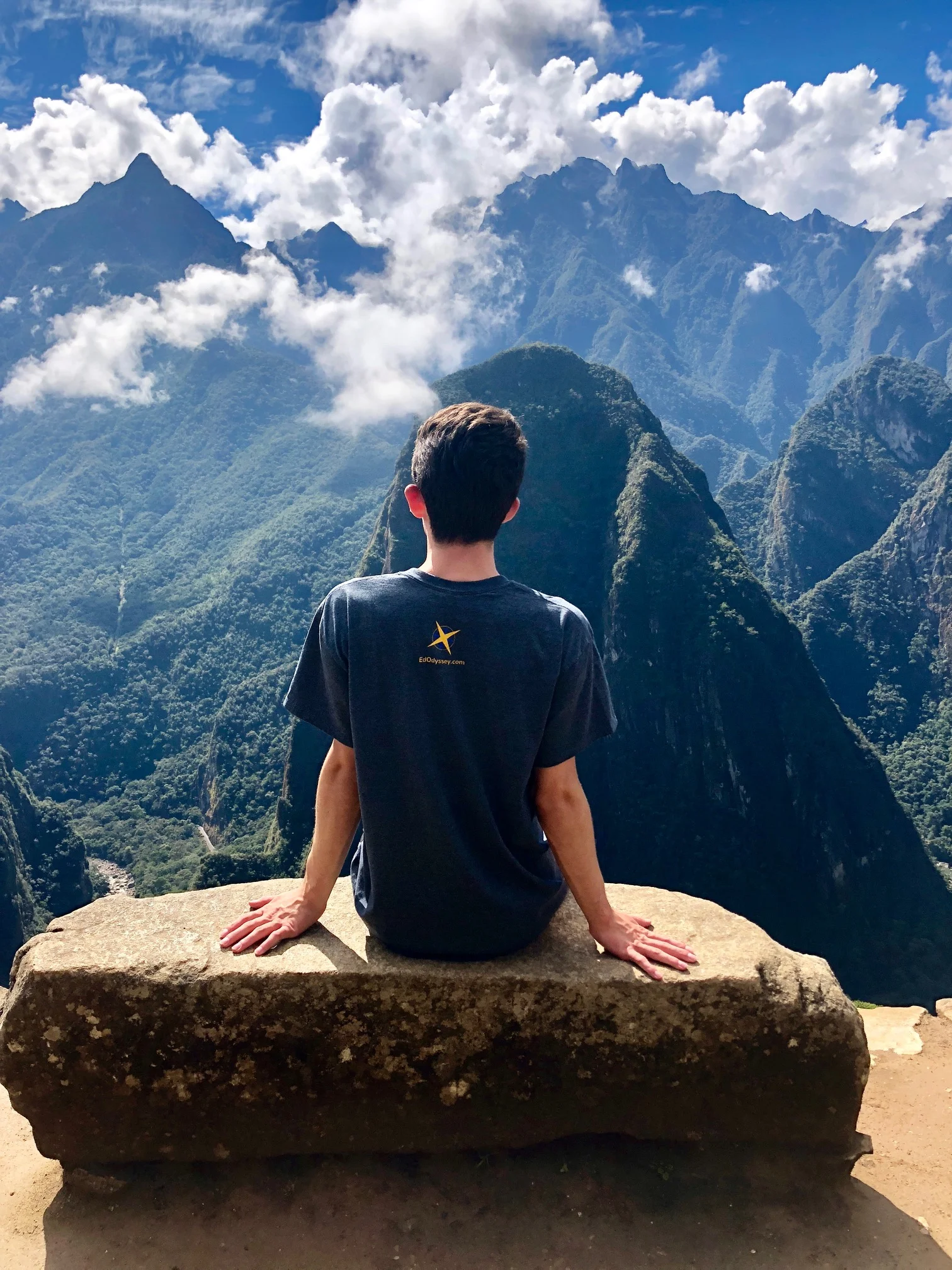5 Customs You Should Know When in Public in China
Once you are in China and adventure out into the public, there are certain cultural differences that you should keep in mind. As you go out to restaurants, for example, there are tricky nuances that can be a little different from the states. However, the truth is that everything that you experience will be new to you in one way or another and it’s important to your time abroad as a learning experience.
Once you are in China and adventure out into the public, there are certain cultural differences that you should keep in mind. As you go out to restaurants, for example, there are tricky nuances that can be a little different from the states. However, the truth is that everything that you experience will be new to you in one way or another and it’s important to your time abroad as a learning experience.
I found these eye-opening moments to be especially true during my trip to China. After learning from my experiences and asking the right questions, I have a much better idea of what one should expect when being in public and traveling to China.
These are my five customs that you should know when you’re in public while you’re in China:
1. Tea Etiquette
You may find yourself having tea in a restaurant or in someone’s home, and you always want to follow proper tea etiquette. If someone offers you tea, you do not want to reject it.
When you with others, if their tea cup is empty or running low on tea, you want to fill their cup all the way to the very top for them. I learned this lesson when one of my friend’s after dinner told me that I should have filled our host’s cup of tea when it was empty, and from now on, I do this at any meal in China.
It can be very impolite to not fill the cup all the way, as it is a sign of respect since you are a guest. If your cup is running low but you would not like any more tea, it is acceptable to politely ask that you would not like any more tea if someone wants to refill your cup.
2. Do not tip
The practice of tipping varies from every country, and in China it does not exist. It may seem normal to tip waiters and waitresses at restaurants or cab drivers in your culture, but you do not have to in China. In fact, any type of service worker may be offended by your tip, as it perceived as pity and suggesting that they need extra money.
I did not know this before arriving in China, and one time when the bill came, I was calculating the tip, and my friend said, “what tip?”. This took some getting used to, but it is a part of the culture to adapt to.
I’m on a cable car going over a river in Chongqing!
3. Crowded spaces
Soon after you arrive in China and use the super-convenient subways in major cities, you will realize that there are a lot of crowded public spaces in China. This is not something to worry about, since navigating and using public transportation is super easy in China.
While you should never touch others in China, the one exception is perhaps riding on the subway and waiting in huge lines. You have to get used to people around you pushing and shoving a little. I experienced this in Shanghai, as the only way for me to get off at my subway stop was nudging my way through the crowd.
4. Do not point with one finger
This custom may seem random or strange, but it is true in Chinese culture. You want to make sure that you are never pointing at anything or anyone with one finger.
I learned my lesson first hand when I pointed to an item on a menu board, and my friend told me afterwards that I should not point, especially in public spaces. It is seen as extremely rude, and you should rather gesture to something with the entire palm of your hand, with no fingers specifically pointed at something.
Enjoying breakfast at a friend’s house!
5. Accepting a host’s generosity
Whenever someone hosts in China, whether in their home or at a dinner, you should be very respectful of your host. Part of this is accepting your host’s generosity. I would advise that you do not offer to pay if you are being hosted by someone. This can be seen as rude, since if there is a clear host, they are expecting to pay the bill. Most people in China never split bills, as one person serves as the host. I once found myself in Chengdu wanting to pay the restaurant bill, but I was refused countless times, and since then I have seen numerous fights over who will be ‘host’ and pay the bill. These good-spirited fights are very common and pretty hard to avoid, but if you are being treated to a meal by a host, you should always express your gratitude and say thank you after a meal.
Whenever you find yourself in public in China, you want to always be mindful of your actions. This self-awareness is especially key since you will stand out in the crowd as a foreigner. As long as you take these different customs into account when you’re out in public in China, you should have no problem going out and exploring this beautiful country
As you learn from your mistakes, you should never be afraid to ask someone you know in China or EdOdyssey any questions you may have because it’s a beautiful part of the experience. With these tips, you should have a better idea about life public and restaurant culture in China!
Five Important Tips When Meeting People in China
Before the beginning of any trip or study abroad, it is a good idea to first learn about cultural differences that exist in that country. One of your biggest worries before heading abroad may be a fear of a difference in cultures.
Before the beginning of any trip, or study abroad, it is a good idea to first learn about the culture and cultural differences that exist in that country. This was one of my biggest worries before heading abroad to China and I know that many of my friends and family share this fear.
Here are my top five tips to keep in mind when meeting and interacting with people for the first time in China:
1. Be polite and formal
During your time abroad, you will meet tons of new people. You may have an idea of what an introduction resembles in your culture, but not every introduction is the same. When first meeting someone in China, I learned you should always be formal and polite.
A formal greeting includes a verbal “nĭ hăo / 你好” (hello - informal) or “nín hăo / 您好” (hello - formal for older generation) and a slight bow of your head. I once made the mistake of initiating a hand shake, but the other person did not reciprocate.
One of my friends gave me Chinese Oreos as a gift!
If you do have a close relationship with someone, this initial interaction could vary, but when formally meeting someone new, you should go the route of a verbal greeting with a slight bow. It is best to not touch and to not hug others, unless the other person initiates it. It is also a very nice gesture to give someone a gift, especially if it is a pre-planned event like a party or meeting.
2. Bring a proper gift
Whether you are meeting someone for the first time in China, or someone you know, then you want to make sure you are giving the right gift. In China, you do not want to give a gift that may have a negative meaning in Chinese culture. Some examples of bad gifts would be clocks (signifying parting or death), umbrellas (signifying bad luck), and four of anything (four is a very bad number in China, as its pronunciation is similar to the pronunciation of the Chinese word for death).
When I was in China, my Chinese friend had asked me what gift I wanted from them. I said that I just needed a cheap pair of shoes, and to my surprise they said that they could not give me shoes as a gift. I asked why and they said that the Chinese word for shoes is very similar to the word for bad luck or evil. This was one of my first instances of learning about Chinese superstitions and what gifts you should avoid giving at all costs!
Some good gift ideas that I have given include something typical or symbolic of where you are from like a mug, pens, or postcards. Fruit, teas, and silk are also very common gifts within China.
I made those slippers look good!
3. Respect their homes
In China, virtually no one wheres shoes inside their home. When entering most homes or apartments, there will likely be a collection of slippers for you to put on as soon as you walk in the door.
Whenever I entered someone’s home, I always found it to be funny when none of the slippers would fit me, since my feet were too big! I would either look ridiculous walking in small slippers or just walk around in my socks, which is totally acceptable too, but you should never walk barefoot in someone’s home.
4. Be punctual
An important thing to remember in China is to always be on time. I once overslept in the morning while a friend was waiting for me outside to go to a meeting. She wasn’t upset, but I could tell that she was annoyed and my tardiness was not culturally acceptable. As someone who is frequently “fashionably late” in the United States, I quickly learned I needed to break this habit fast. Over my gap semester I became much more punctual. Delays still happen, and when they do, I also learned it is best to not give an excuse but rather humbly apologize to those you kept waiting.
Taking a tour of a school before I did a presentation.
5. Avoid certain taboo topics
Similar to many other cultures, there are certain topics that aren’t casually spoken about in daily conversation. One day I was curious if these topics were similar to taboo ones in the States so I asked one of my close friends. She explained to me that politics, religion, death, and any historical or political incidents of China’s past should not be talked about, especially with new friends or casual acquaintances.
You will find that people will be very interested in you and where you are from since you are a foreigner, and this a great conversation starter. Typical (and appropriate) conversations include talking about food, sociocultural topics, and your level of Chinese!
In short, these are just a handful of the many cultural differences I experienced during my time in China, and you are bound to encounter too. Don’t be afraid of making a mistake, either. As you’ve read, I’ve made a handful myself.
What is most important, I found, is that you enter with an open mind and willingness to learn, understand, respect and find beauty in these cultural differences. Whenever I wasn’t sure my friends, EdOdyssey, and really anyone I encountered in China was always enthusiastic to help and patient with me as I learned. I can’t wait to return to China and learn more.
Want to learn more about China? Check out my blog about How Chinese Food in China Changed Me Forever!
How Chinese Food in China Changed Me Forever
What is one of the best parts of traveling abroad? It’s the food, of course! Eating different foods native to a country, authentically prepared by locals is special, as it is not the same here in America. Trying these native foods will only widen what you know about a country's cuisine.
What is one of the best parts of traveling abroad? It’s the food, of course! Eating different foods native to a country, authentically prepared by locals is special, as it is not the same here in America. Trying these native foods will only widen what you know about a country's cuisine.
I discovered that this is true for Chinese food. Chinese food in China is much more diverse and rich in tastes and spices than I had ever imagined prior to my travels.
Through trying dozens of new dishes in China, my perspective on Chinese food has changed, but for the better! I now have a love of Chinese food that I did not have before, and wish that more dishes in the states had as much flavor as those I tried for the first time in China.
Spring rolls, one of my favorite American Chinese dishes!
Prior to traveling to China, I was a little worried whether I would really enjoy the food or not. Before my gap year, I had always stuck to certain routines and I was not a very adventurous eater.
I was not sure what types of food I would be trying, but I have always enjoyed eating Chinese food here in Massachusetts ever since I was young. However, I was only used to the steak teriyakis, vegetable lo meins, egg rolls, spring rolls and pork fried rices of American Chinese cuisine.
Don’t get me wrong, I still love these dishes from my local Chinese restaurants! However, I did not realize how much variety of food there actually was to try in China and the cultural differences that I would learn to appreciate during my time abroad.
Chinese Food in China: My First Impressions
Within the first few days in China, I started to get acclimated to Beijing but I did not enjoy everything that I ate at first. At first, I mostly disliked how breakfast in China is nothing like a hot American breakfast because there were no donuts, bagels, or egg sandwiches.
Check out the Peking Duck in the center!
One of the most common breakfast items that I was first introduced to was “baozi”, a steamed bun filled with pork. The first time I ate baozi, I felt strange eating a lot of meat for breakfast. This was simply an adjustment for me, as I then began to eat delicious lunches and dinners.
In my first few days, I fell in love with one of Beijing’s most famous dishes called Peking duck. Some of my friends had told me that we were going to one of the best Peking duck restaurants in Beijing, and they were not wrong!
The Peking duck we dined on was amazing, with thin, crisp skin on the outside and delicious duck meat on the inside, and numerous tasty sauces to complement it all. After I traveled to different cities in China, I began to learn that each place was famous for a particular dish and locals were extremely proud of their food.
Load your bowl with side ingredients and then pour in the hot pot!
New Foods, New Beginnings
As I began trying new foods, such as Guilin mifen (rice noodles) and Shanghai “xiao longbao” (soup dumplings), I started to acquire a taste for these foods that I had never tried before in my life. While I was in Chengdu, in the Sichuan province of China, I learned about the ingredients of an authentic “huo guo” (hot pot), and learned my lesson to wear the apron while doing so! By the end of my trip, I knew that I would miss the diverse range of foods from China once I got home, and realized that there was nothing to be weary about before my trip.
After my time abroad in China, I realized how much more of an open mind I had when it came to eating and trying new foods. I also soon realized that the Chinese food here in America is different from that actually in China.
The Taste of Nostalgia
Attending school in a city, I am fortunate to have a “Chinatown” nearby, which does have some great authentic Chinese food. I still enjoy eating Chinese food here, but at the same time, I miss the tastes from China.
When it comes to food, to taste the best of the best, you must go directly to the source. This is yet another benefit of traveling the world and expanding your appetite to new foods that you perhaps have never tried!
Ready to taste the difference for yourself? Start Planning Your Trip so EdOdyssey can help get you on your way!
3 Beautiful Realizations From Unexpected Travel Changes
As both travelers and educators, we plan out the details of our trips abroad as best as possible, but unexpected changes happen along the way. The weather changes or there’s an expected delay. There’s nothing that anyone can do in those moments except be patient.
You know that unsettling feeling when you look around and you feel your stomach drop as you realize something doesn’t feel right. You start to look around and you feel out of place and you get frustrated. Your mind races and you get overwhelmed because you come to a realization that your trip isn’t going 100% according to plan.
Now what do you do about it in that moment? At EdOdyssey, we want that you embrace that uncomfortable moment and explore it with us.
As both travelers and educators, we plan out the details of our trips abroad as best as possible, but unexpected changes happen along the way. The weather changes or there’s an expected delay. There’s nothing that anyone can do in those moments except be patient. No one can foresee these moments, but all of us can adjust our mindset to take in these beautiful and teachable instances if we have the right mindset going into our trips.
When the train makes us wait, or the weather slows us down, all we can do is manage our reaction. No traveler wants to leave a country with bad memories and we don’t want anyone on our trips to not leave satisfied either so we need to see the splendor in everything!
Therefore, we want to share three of our beautiful realizations that come from changes.
The Beauty of Cultural Differences
In general, we can have lofty expectations and standards from back home that we unjustly communicate onto other cultures. When we travel, we have an idea that buildings and places will look different but at some point all of us struggle with how aspects of other cultures feel different. For example, at restaurants in Europe, the service tends to be slower and less individualized than in the United States.
All of us feel this slower pace, and we can either feel frustrated or take a moment of introspection to see the bigger picture. We’re all getting more time to spend with friends in an amazing place about to eat some delicious food. The drinks might take a couple more minutes, but take a step back, and ask yourself if you’ll remember that as being the moment that ruined your trip.
In those moments, we have to take a second to understand that our frustration comes from feeling something different and we have to ask why it feels different. At EdOdyssey, we understand these frustrations and these differences and we want you to understand these feelings because ultimately it helps us understand...
The Beauty of Reflection
When you’re at home, you have your own individual routines and your own structure that gives you a sense of comfort that disappears quickly when traveling. When you travel abroad with us, we do our best to customize the best trip for you and prepare for everything, but even still there might be unexpected changes.
Ultimately, we can’t control long lines and unexpected waits, but we can manage our attitudes and how we roll these changes as individuals and as a group.
In those unexpected moments, we ask that you take a second to reflect on the beauty of the moment. You’re with your friends, you’re trying new foods and seeing unbelievable things. In a few weeks and moments from now, do you think that you’ll remember a little rain?
If I learned anything during my time abroad, I understood how to let go of my expectations and embrace mistakes and confusion.
During your time with us, we plan our trips as air tight as possible but sometimes life happens and reality gets in the way. There’s an unexpected delay or a last second modification. Take a second, look around, and embrace the moment.
Talk with your classmates and friends about what you’ve done or what you’re about to do!
The Beauty of Help
We’ve all had these incredible moments in our lives when we find ourselves lost and we don’t know what to do. We’re with a group one second, we look away or get distracted, and then we can’t find them.
As little kids, teenagers or grown adults, we’ve all lost track of our friends and family at some point. As humans, we share this truth and we have to stay optimistic and understand that people will be there to help you.
We are there to help and we hope that you’ll come along and join the ride with us so we can share the beautiful experience of traveling abroad together!
EdOdyssey's Epic Six Day Finale For Fall Study Abroad 2018
We always save Cusco for the end because at the end of every study abroad semester in Lima because it’s a special way for our local staff at EdOdyssey to wrap up an emotional semester abroad with our students. As a final touch, this past semester our study abroad students took an amazing trip to Cusco and Machu Picchu with Patty, our Peruvian Program Coordinator.
Every semester our study abroad program includes three excursions to make sure students return home with the most holistic glimpse of Peru. As one of the most ecologically diverse countries in the world, it has 84 of the 108 ecosystems and 28 of 32 possible climates. Wouldn’t you want to see and experience as many as possible?
We always save Cusco for the end because it’s a special way for our local staff at EdOdyssey to wrap up an emotional semester abroad with our students. As a final touch, this past semester our study abroad students took an amazing trip to Cusco and Machu Picchu with Patty Valencia, our Peruvian Program Coordinator.
We want to give you all a quick look back at what our end of semester trip with our students looked like this past fall semester because we wanted to leave our students with a fantastic send off with the most authentic look at life in Peru.
Day 1 - The Arrival: Mental & Physical Preparation
During the first day in Cusco, the students and our team took it easy and stayed in the city of Cusco. At an altitude of around 11,000 feet, they got adjusted to the local feel. This first day, they acclimated to the local climate. The next five days involve an emotional roller coaster packed with visiting more than five cities, two trains, countless hours of hiking, an experience with a shaman and a meal that they’ll never forget.
Day 2 - Hospitality & Haggling: The Local Experience
They visited one of the nearby local Amaru communities and saw what it’s like to live like a location. They saw a presentation in Quechua - the local language in the village - and the community members had the students dress in the local attire. During their day in the community, they learned how to harvest beans and how the locals add their bright colors and designs to the typical clothing.
It wouldn’t have been a trip to the local community without some local hospitality. The locals had them try some of their famous local potatoes, natural teas, and quinoa to later show them some local goods in case they wanted to buy anything.
After the students learned how to live like the locals, they put a semester’s worth of Spanish to the ultimate language test: bargaining and buying at the local artisanal market. Patty told us that it was the first time that she saw such a big group of visiting students haggle over prices, and her reaction was priceless:
“Incredible! It was the Spanish immersion talking!”
After they bought an assortment of goods that ranged from fun pants to Peruvian-style sweaters the group visited a farm with alpacas and llamas where they got to feed them! As they took the road to Machu Picchu, they made a few stops along the way. Now, if you go by yourself or with an agency, you would probably go straight to the town where Machu Picchu is, but you’d miss a wild ride!
Day 3: Four Cities, Marching Toward Machu Picchu
On the third day, the group went to see the famous salt pools in Maras that are world-known Peruvian pink salt, as seen above. Later, they had lunch in Urubamba and saw the ancient ruins in Ollantaytambo before catching the train to Aguas Calientes. While on the train, everyone started to look over their pictures taken during their jam-packed trip, but one of the students stopped Patty to ask:
“How can you look at photos right now and miss one of the most beautiful train rides ever?”
Needless to say, everyone put their cameras away as they began to leave the mountainous region of Cusco and approached the wilderness and jungle on the way to Machu Picchu.
Day 4 - Finally Arrived: Machu Picchu
Some students woke up earlier and took another route up to Machu Picchu known as “La puerta del sol”, or sun gate. They communicated with Patty through WhatsApp as they took an alternative route with marked signs that lead up to “The Old Peak”, which is the translated name of Machu Picchu from Quechua to English.
After they arrived to the peak, they learned about the ancient history behind the ancient Incan civilization and how it was rediscovered. After hiking all day, they took their market haggling to the next level to get some local souvenirs before taking the ride from Aguas Calientes to Cusco where they slept.
Day 5 - An Evening With A Shaman & Guinea Pig dinner
In the morning, some rested while others others enjoyed going to the seven-colored mountain. In the afternoon, the farewell was a special event with a local shaman that performed a ritual that read into their respective futures in private that left them as happy as well as fascinated.
After they enjoyed partaking in ritual, they went to try one of the local delicacies - guinea pig. They tried it but we think that one time was enough!
Day 6 - The Final City Tour, The Predestined Farewell
They did a quick tour of Cusco before heading home to the United States. As fate would have it, their flights got delayed. They took that time with Patty to recount their orientation, their trips, and to reflect on everything that they learned during their time in Peru. One of the students reflected in their excursion to Ica where the students spent the nights in tents in the dessert and under the stars as one of their favorite moments of the semester.
We hope that all of our students come away with moments that make them feel the magic of another culture. Whether they enjoy the more quiet moments or the unsettling moments that challenge their comfort zone, the entire experience has taught us that we have to appreciate the moments with the people around us.
Ready to take the leap to see Peru with us?
Check out our EdOdyssey Study Abroad Page for more information!
Five Ways How I Keep My Study Abroad Experience Alive
Are you thinking about traveling in the future or have already travelled during a study abroad? Here is my guide on how to keep the vibe of your experiences abroad alive. After studying and traveling abroad, I know how it feels to come home and encounter difficulties keeping this vibe alive on campus.
Are you thinking about traveling in the future or have already travelled during a study abroad? Here is my guide on how to keep the vibe of your experiences abroad alive. After studying and traveling abroad, I know how it feels to come home and encounter difficulties keeping this vibe alive on campus.
However, there are personal ways to hold onto your experiences, like writing about your perspective abroad and having worthwhile conversations with those at home, while continuing the conversation and relationship with those you met abroad. There are also ways at school to achieve this, through continuing a study of a certain subject or language that enhanced your trip, and discovering programs or groups on campus to study or travel abroad. Experiences abroad are not simply a check on a checklist, they are meant to impact and shape you, through all of the amazing and maybe not so great experiences alike.
How can you keep the vibe of your study abroad experience alive?
1. Talk to others about my experiences
During my first semester on campus after study abroad, I found that an easy way for me to keep my study abroad experience alive is simply talking to others and sharing my experiences. I discovered that it was important for me to share the details of my trips and how I was impacted with my family and friends. It was important for them to know that I was not the same person after coming home, as I became more confident in myself and found a new appreciation for traveling. Initially, I struggled a bit with doing this, as it is difficult sometimes to convey to others an experience that was not shared, besides on social media.
I found myself a little frustrated, as some people asked questions like “They have an airport?” or “What did you eat?!”. Looking back on this, I should not have felt so upset or puzzled why others had these thoughts. Rather, I should have been more understanding and gone into these conversations with the same mindset that I went into my trips with. After having full and meaningful conversations about my experiences abroad, those surrounding me knew more about why I was so open-minded when it came to food or why I had such an easy-going attitude. I was happy because they had a better idea of who I am and why I am so passionate about what I do.
2. Keep in touch with those I met during my experiences abroad
After traveling abroad and meeting new and amazing people, I knew that I wanted to remain in touch. Nowhere in my imaginary study abroad guide does it state that I must stay in touch with anyone I met, but this was my choice. Those I met in China and Peru shaped my trips in both countries. Why wouldn’t I want to remain friends and in contact?
I talk to one of my friends from China nearly everyday through WeChat (China’s largest messaging and social media application). I find that this is important to do after traveling because I was not in China and Peru for solely a week or two, I made connections with people that I see lasting my entire life. Through this, I still feel connected from the states, in a different way to China and Peru, whether it is social media, phone calls, Facetimes, or texts. I am constantly reminded of my friends in China during my daily Mandarin class, when we discuss Chinese culture and ways to speak Mandarin like a native speaker. If I have any questions about Mandarin, I sometimes turn to them via WeChat to better understand what I am learning, whether it is making sure my pronunciation is correct or that I am not saying something offensive in Chinese culture in my homework.
3. Get involved with programs that involve travel at school
When I started college after my gap year, I wanted keep the vibe alive from my year off. I asked myself, how can I accomplish this on campus? After attending several club and activities fairs in the beginning of the school year, I was excited at how many clubs and programs there were available to students that involved aspects of traveling abroad.
After I applied and got accepted for a board position, I joined a program that hosts a liberal arts camp for students in Vietnam during the summer. I have met some of my closest friends at school from this program and I am so excited to travel to Vietnam this summer! If you want to get a taste of being abroad but you are not sure that you want to study abroad for an entire semester, research what programs your school offers that are not necessarily a semester long! You never know what can happen when you get involved in activities and programs!
4. Continue studying the languages I learned abroad
Another way while now on campus how I like to keep the vibe alive is continuing to study the languages I studied abroad. On my first day of college, the first class I shadowed was a Mandarin class. I loved the class and decided to enroll. If this had taken place a year prior, I most likely would not have been studying Mandarin. This would not have even crossed my mind, but after my experience in China, I wanted to learn more.
By continuing this study, I feel even more connected to China and my friends in China, especially as my Mandarin continues to improve (hopefully). After taking Spanish classes in Peru, I still practice Spanish by speaking with others and using learning applications on my phone like Duolingo. I am currently focusing on my study of Mandarin, but depending on my future course schedule I really want to take Spanish classes too!
5. By writing about my experiences
I have discovered in my life the power of writing. For me, I like to capture how I feel or relive my experiences through writing. Today, I enjoy reading my different pieces of writing from my time abroad. It serves as a great reflecting time and also reminds me of events or days that I might have forgotten otherwise. My writing has empowered me to share unique thoughts and experiences with others.
I constantly remind myself to put my thoughts onto paper, as each piece serves as time capsule of memories. I do not to forget these memories because anyone can take a picture, but only I can write about my experiences. This is a part of one of my journal entries:
“China is not this mysterious country in a faraway land. I am happy that I can write this while sitting in a coffee shop 7,796 miles away from home and have no worries at all. I feel a new sense of freedom.”
Traveling abroad is different for everyone, but a commonality is the value that is attained while abroad and then at home. Your study abroad experience is about you and it is ultimately up to you in what you want to get out of it. It is important to remember that a past trip can have a huge effect on your future, and you never know where that experience may take you! A trip abroad does not end with your flight back home, it is up to you to keep it alive.













